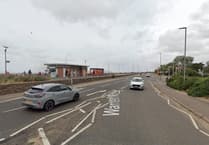TRADERS in Williton fighting the development of a supermarket they fear will rip the heart out of the village's retail centre won massive support from local people this week.
More than 230 people attended a public meeting called by the Williton Chamber of Commerce and overwhelmingly backed the organisation's view that the village would stand to lose more than it could gain from the scheme being put forward by long established agricultural machinery specialists J Gliddon and Sons.
The proposal would also include a 175-space car park, a further 1,300 gross square metres of units, plus office accommodation, five flats and a pedestrian link forming a precinct through to Fore Street.
But chamber chairman Ken Westall told the packed meeting at Danesfield Middle School on Tuesday that this was a watershed moment for the village and its trading future.
He said Williton had a vibrant retail community.
"Our traders represent all that is good," he said. "We have to be concerned about the scale of this supermarket proposal."
The meeting heard from former chief planning and development officer at West Devon District Council Stephen Gill that the applicants' own impact assessment showed there would be a 47 per cent loss of business for the existing Spar store, 35 per cent for the Co-op and 14 per cent for other shops.
Mr Gill said the proposal would have a huge impact on existing retailers and almost certainly lead to the closure of most of them.
He said far from increasing choice for shoppers, it would wipe out almost all competition to the supermarket.
Williton was a village with a population of just under 2,600 people and its role as a rural centre was not to compete with Minehead, Bridgwater or Taunton.
"It is a myth that if you don't have a big supermarket, your main food shopping needs cannot be met - more and more people are living by 'top-up' alone," he said.
Mr Gill said the scale of the proposed supermarket was disproportionate to the size of Williton's centre, which had just 20 retail outlets.
And the inevitable closure of many of the existing shops would undoubtedly have an adverse effect on Williton's vitality and viability.
Mr Gill, who has helped co-ordinate campaigns in Wadebridge and Tavistock to fight supermarket plans, told the meeting that in Tavistock the impact figures for a proposed store showed a loss of 16 per cent of trade for the town's Co-op and 6.8 per cent on other shops.
This was only half the impact that would be felt in Williton yet it was sufficient to persuade a planning appeal hearing to reject the plans.
Mr Gill said Williton was a village steeped in tradition with a vibrant local trading community.
Even taking the surrounding villages into account, there was nothing to suggest that it needed a major supermarket.
"From a planning and community perspective, including the substantial impact of traffic flow through Williton, these plans should be rejected," he said.
"If councillors have just one per cent of doubt about the impact of these plans, they should reject them.
"If the applicants decide to go to appeal, then the matter would go to a public enquiry where proper cross-examination and evaluation would take place."
Mr Westall told the Free Press that the chamber was "stunned and delighted" by the support shown for its anti-supermarket stance.
"It was a marvellous turnout," he said.
He said the chamber would be submitting its formal objections to scheme - which could go before West Somerset Council's planning committee in April - and would also be formulating further details of its campaign of opposition.
Traders would be putting together a number of initiatives, including a possible petition and the launch of a 'Love Williton' website where the local community would be able to post objections and comments.
"This meeting has shown that Williton wants to preserve its special status and we will do our utmost to see that corporate predators like Sainsbury and Tesco are shown the door in the clearest possible way," said Mr Westall.
After the meeting J Gliddon and Sons' spokesman David Gliddon admitted he was disappointed by the reaction to the scheme.
"People need to look at the positives, which include the creation of 150 jobs," he said.
Mr Gliddon was adamant that the development of the supermarket would not lead to the closure of any existing shops: "The net gain to traders will actually be an increase of £800,000 a year in turnover."
He said the application had received 30 letters of support and retailers had nothing to fear if they were "up to the mark".
He said it was wrong to suggest that Williton was just a small village - it had a library, hospital, two care homes, an industrial estate and was the administrative centre of the district council.
The surrounding villages it served took the population to around 9,800, with a further 9,000 'holiday beds' locally.
"It is more accessible to most of West Somerset than Minehead," said Mr Gliddon.
"It is the centre of the district and is probably where most of the growth will happen."




Comments
This article has no comments yet. Be the first to leave a comment.